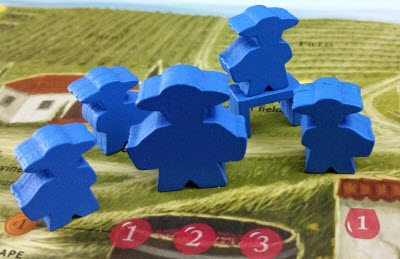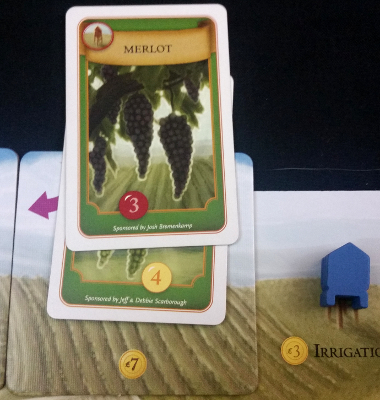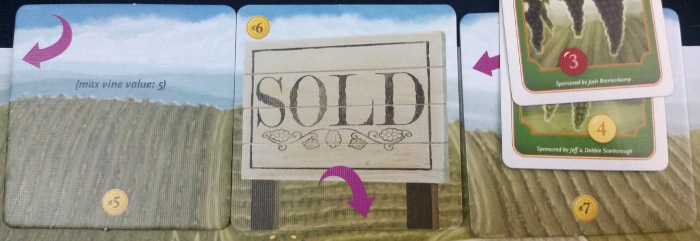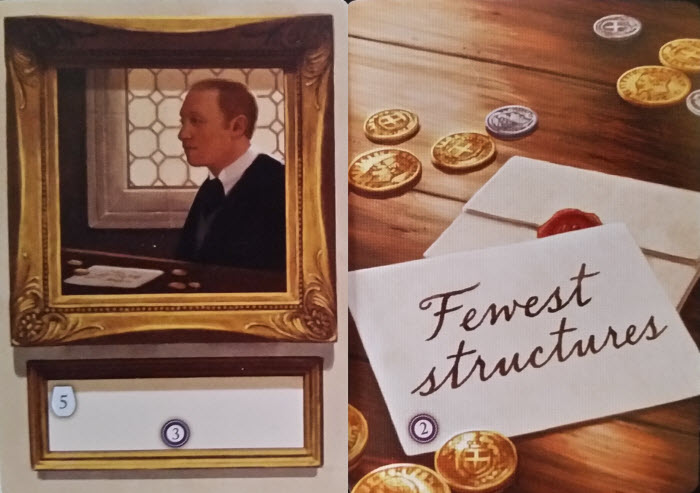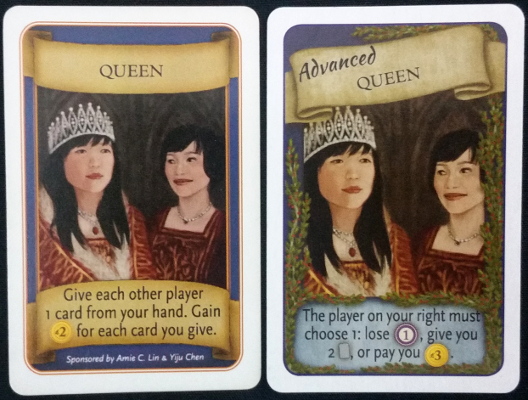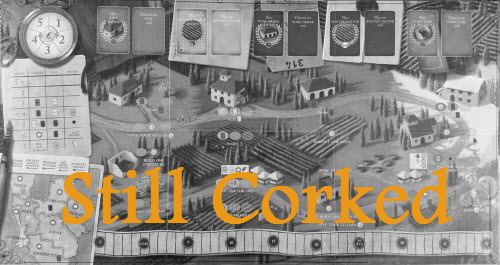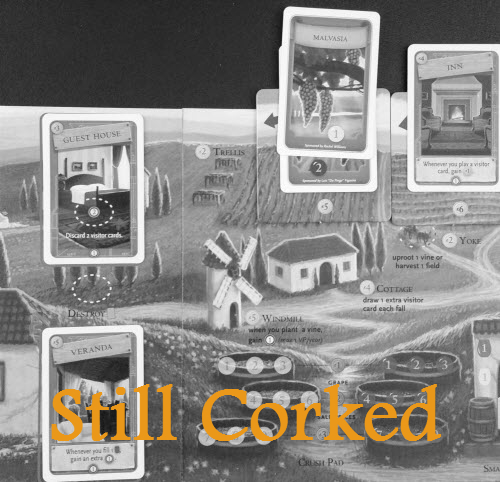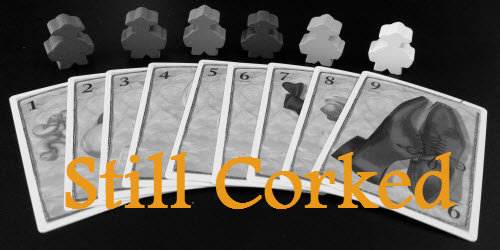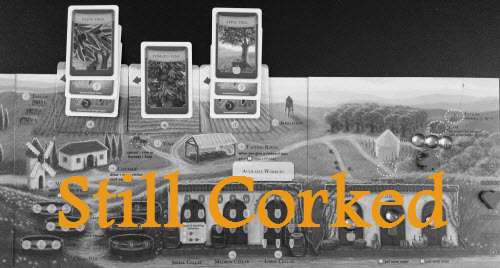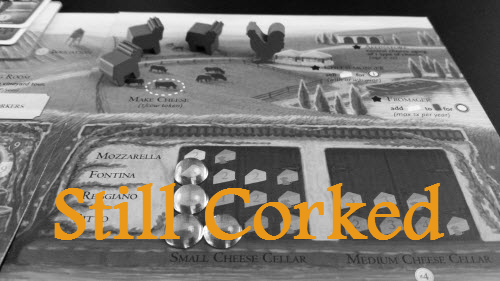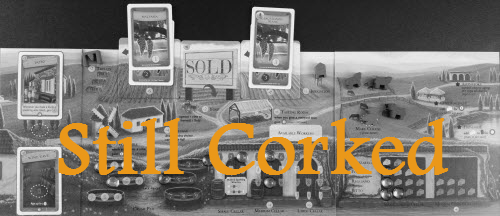Note 1: This review pertains to an expansion for Viticulture and requires the base game to play. We are also assuming that you are familiar with the base game, or at least have read its review.
Note 2: We are currently conveying Tuscany as a semi-Legacy review. You can read more on this here.
Note 3: In the time since the initial review portions were published, Tuscany has been segmented into multiple products under Viticulture and Tuscany Essential Editions. This will be addressed in the final wrap-up.
Buongiorno Antonio,
As requested, I have compiled the numbers for our current capital and prospective financial outlook regarding the vineyard over the next three years. Given that crop yields are continually improving, operating expenses have remained flat, and tourists have seen a steady comparative week-over-week increase over the last 15 months, income projections look favorable through the end of next year at a minimum. To answer your question: not only is it possible to look into new ventures, but the payoff could be well worth the investment. It’s time we expand.
-Emilia Rossi, Contabilità
The Premise
In the base game of Viticulture, the ultimate goal of players was to establish and create the most successful vineyard in the Tuscan region. While initially a fevered dream, that goal has now been met – and then some. In Tuscany, players are presented with a number of ways to improve their winemaking prowess further and leverage their newfound prosperity into other exciting ventures.
New Rules, New Ambitions
The release of Tuscany coincides with the update of Viticulture to its Second Edition ruleset. Changes to the game from its First Edition run aren’t numerous, but they bear mentioning as players familiarize themselves with the expansion content since Tuscany uses the Second Edition rules. There are seven changes of note, with the lattermost two being the most significant in terms of gameplay:
- The starting player is now determined randomly.
- Eleven visitor cards have been updated with new or clarified functionality.
- The “friendly” rule, where players could not take an action spot with a bonus if they couldn’t or didn’t want to use the bonus, has been removed.
-
Players may now use the uprooting or harvesting option of the Yoke action during Summer or Winter.
- There is no longer a 25 VP scoring cap.
- Viticulture now has a grande worker as part of a player’s six units. Although being a larger meeple than the rest, the grande worker largely functions the same as any other worker. The difference is that a grande worker can be placed on a board action space for its effect even if all other spots at that location have been filled, thereby giving players access to a location even if they were initially locked out.
- Viticulture has simplified the crushing grapes action. Instead of being limited to a type of wine being made, a player now converts grapes into any two wine tokens of their choosing (three with the bonus).
Beyond these changes, Tuscany is also designed to be played in a semi-“Legacy” manner. Rather than simply adding all of the expansions to Viticulture, or adding them piecemeal, players progress through one expansion before unlocking (uncorking) the next, providing both a learning curve to the expansions and a loose narrative as to how an individual’s vineyard grows and expands.
To that end, the expansions are divided into three tiers. After a couple playthroughs with one expansion, the winner states which expansion will be uncorked next. Subsequent games then use both the newly uncorked expansion and any previously unlocked ones.
Once all tier one expansions have been unlocked, players repeat the process for tier two. Upon completing all tier two expansions, Tuscany’s three tier three expansions become available. Unlike the rest, tier three expansions are modular; only one is used at a time in conjunction with the rest.
Since there are no physical changes to the game itself, however, players are free to reset Tuscany at any point and begin the unlocking process anew (hence the ‘semi’ part of semi-Legacy).
In addition, Tuscany now provides the capability of Viticulture to be played solo. Called Automa, solo mode has one player square off against a semi-automated opponent for seven rounds using a special card deck. The full rules to Automa can be found in the rule book, and with the exception of one, single player mode is either partially or fully compatible with all Tuscany expansions.
Tuscany Expansions
To jump to a particular expansion, click below:
Tier One Expansion: Mamas & Papas
Tier One Expansion: Advanced Visitors
Tier Two Expansion: New Visitors ![]()
Tier Two Expansion: Extended Board ![]()
Tier Two Expansion: Special Workers ![]()
Tier Two Expansion: Structures ![]()
Tier Three Expansion: Arboriculture ![]()
Tier Three Expansion: Formaggio ![]()
Tier One Expansion: Mamas & Papas
Building a reputable vineyard takes the kind of starting capital and resources that aren’t easy to get. Luckily, your parents have presented you with a modest inheritance to help get your dream of winemaking off the ground.
Rules Creep Factor
Mamas & Papas is a minor expansion to Viticulture, offering players asymmetric starting conditions. Rather than everyone beginning the game with three coin, a Pinot vine, and a Summer visitor, players instead randomly receive one Mama and one Papa card which are resolved before the first round. Players always receive three workers (two regular and the grande worker) as a result of these pairings, but resources vary beyond that. Mama cards determine the types and quantities of cards a player begins, whereas Papa cards specify how much coinage a player gets. Papas also provide the player with an option of either starting with a specific structure / extra worker, or forgoing it in exchange for extra money.

Naja and Stephan give this player three workers, four lira, a Summer card, two Winter cards, and either Irrigation or another two lira.
The Rundown
The Mamas & Papas expansion has a small but significant impact on Viticulture, and that influence is largely positive. These cards alleviate a common problem in Viticulture (and many other Worker Placement games), where everyone familiar with the game gravitates towards the same early game strategies due to identical starting conditions. By giving you a wide variety of asynchronous resource possibilities, Tuscany’s Mamas & Papas provides players more freedom of choice right out of the gate. This module offers just the right amount of diversity to early game decisions but deftly does so without disrupting game balance or tension.
For experienced Viticulture players, this is a welcome expansion that provides a more dynamic start to the game without injecting any real complexity. For newer players, though, it’s not always the most beneficial. To them, this expansion will be neutral at best and a setback at worst. Although the game insists that these cards don’t force you down a specific strategic path as a result of your parent’s gifts, it’s harder to go against that tide than with it. Deviating from those paths are even more difficult if you aren’t readily familiar with the game. To a newcomer unsure what they should be doing in Viticulture, the variety Mamas & Papas offers a guidepost to follow, which can be helpful. To those who like to explore new game strategies on their own, however, their presence can paradoxically make starting the game off tougher.
Tier One Expansion: Property
The prospect of excess unused vineyard lands has raised the possibility of selling off a portion of it for some extra cash.
Rules Creep Factor
Property is a very minor expansion to Viticulture, providing the smallest impact of all Tuscany additions. Because of this, the rules changes are minimal. At the beginning of the game each player receives three field tiles valued at 5-7 coins which are placed over the fields on their player board. These values serve two purposes. First, they stipulate the new planting capacity of the field for vines, rather than the standard maximum of six. Second, it allows the player to sell that field (or buy it back) for the listed amount.
To do this, players take the Sell Grapes action, which can now alternatively be used to buy or sell a field. Once activated, the player can either flip one of their vacant fields to its Sold side and collect the listed coin amount or pay that amount to flip a Sold field back to normal.
The Rundown
Properties is not a very flashy expansion to Viticulture, but its presence is unquestionably felt. At its most basic, Properties acts as a smoothing mechanic in early rounds when money is tight. Rather than spending your starting efforts digging up the money to build mere basic structures or recruit a new worker, selling even your smallest field gives you enough coin to focus more on developing your strategy than about merely getting your vineyard off the ground. This likewise alleviates the issue of players falling behind due to an early purchasing mistake or being locked out of worthwhile money-generating actions. This both makes the game flow better and gets players invested more quickly; for this alone Properties makes for a highly useful addition to the game.
There are two caveats, however. The first is that its influence becomes rote over time. Because the majority of the time people don’t tend to use more than two fields, players will almost always take advantage of liquidating real estate in the first few rounds. It becomes such a common occurrence, in fact, that it be argued players simply have a Sold field and extra money to begin with instead.
The second deals with buying fields. The flavor behind Properties is that you have the ability to buy fields as well as sell them. The thing is…people don’t.
There are a only a handful of circumstances where there are incentives to buy back fields (such as with certain Patronage goals), but most of the time you simply take the money and don’t look back. The one exception to this is in games of three or more players, where you’re able to take the Flip a Field action for the 1VP bonus. So long as you have the cash on hand and a worker to commit, this new strategic avenue, while minor, has the potential to net you a quick VP every round – which can be handy in close games. Still, as advantageous as Properties is for selling fields, the incentive for buying them in Properties is a bit fallow.
Tier One Expansion: Patronage
Your vineyard’s reputation for quality products and service over the last few years has finally caught the attention of several high end wine connoisseurs. One of these patrons could raise your prestige even higher – if you’re willing to enter into a friendly wager.
Rules Creep Factor
Patronage is a minor expansion to Viticulture that introduces hidden goals that players can strive towards. At the beginning of the game players receive a double-sided Patron card as part of their starting materials. The public side of the card is the same for all players, depicting a portrait of the Patron. The other side provides a secret objective that, if achieved, provides additional VP at the end of the game.
To gain access to their objective, the player must first activate their Patron card. To do this, the player fulfills the Patron’s order as if it were any existing wine order. Every Patron order is the same, requiring a 5-value wine of any kind in exchange for 3VP, but they don’t generate residual payments.
At the end of the game, the hidden objectives of any activated Patron cards are revealed. If the player meets their Patron’s requirements, such as having the most structures, they receive the bonus VP.
The Rundown
Although the Patronage expansion doesn’t fundamentally alter Viticulture, its minor influence can be felt during pivotal moments in the game.
Firstly, Patrons provide an easy wine order to fulfill in the latter half of the game. It can be frustrating late in Viticulture when your chances of winning hinges on whether or not you draw a useful wine order. With little effort Patrons alleviate some of this luck of the draw dependency by providing access to an easy option. In this way, Patron orders aid everyone equally without altering the flow of the game or providing one-sided advantages, making it an appreciable addition to Viticulture.
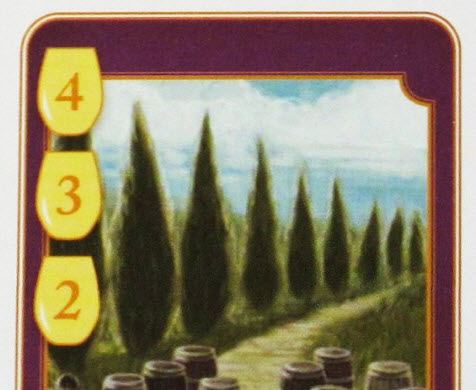
A terrible draw if you only grow reds…
The secret goals elicit a more mixed response. Much like the Mamas & Papas module, the hidden objectives help new players shape an early strategy. Patronage uses a similarly light touch, providing a goal while still giving you the freedom to explore the different ways of getting there. What’s more, Patronage adds an extra thrill to the winemaking world when everyone reveals their goals to see who succeeded, and this is done without creating wild point swings. In fact, it’s possible to forgo secret objectives entirely and not have it affect your chances of victory.
In contrast to Mamas & Papas, however, experienced players will be less enthused by Patronage’s agendas. This is because you often will either feel compelled to accomplish your goal at the expense of other ambitions or accept that you are leaving points on the table. Though few Patronage goals are very difficult, some are easier to achieve than others – especially if you didn’t invest in the strategy it requires.
That said, the biggest change with Patronage is how it affects the game’s margin of victory. With Patronage in effect, attempting to win by one or two points in Viticulture now becomes a bit of a gamble if your competition has an activated Patron. Because of this, players must either activate their own Patron or find alternative ways of boosting late game points. As a result, although it has a generally positive impact, for many Patronage can also make the secret objectives more like an obligatory hurdle to jump through for needed points rather than a bonus you can shoot for.
Tier One Expansion: Advanced Visitors
As the vineyard has become more rooted in the region, your vineyard has begun to benefit from loyal customers and regular visitors, many of whom are offering new suggestions to improve things even further.
Rules Creep Factor
Advanced Visitors is a small but notable expansion to the game, though it doesn’t add any additional rules complexity to Viticulture. Advanced Visitors is a set of 30 summer and winter cards that represent upgraded versions of most of the existing visitors in the game. Some of these are modified versions of the original cards, but the new trait to Advanced Visitors is that most of the cards provide the player with two different effects to choose from then used. These cards can either be simply mixed in with the base game cards, or, alternatively, can replace their original iterations.
The Rundown
One of the most common criticisms with Viticulture is the range of usefulness of the game’s summer and winter cards. By design, some visitors were aimed to be more useful earlier rounds whereas others are better suited for later. As such, it’s not uncommon to draw cards that are completely meaningless to you, either because they don’t match where you are in the game or they simply don’t fit your current strategy.
Going beyond mere luck of the draw, although the visitors’ overall randomness added to the game’s variability, the efficacy (or lack thereof) of some cards could make playthroughs more uneven than intended. Recognizing some cards proved too situational or too unintentionally powerful, the Second Edition of Viticulture updated a portion of them to correct this problem.
Advanced Visitors takes this idea one step further by introducing visitor cards with two actions to choose from, doubling both the card’s usefulness and the likelihood you can use it to your advantage. Most simply add a second option, though others have been reworked entirely. Having multiple options reduces the feeling of ‘dead’ cards in your hand while making the process of attaining and using visitor cards more enjoyable and more efficient.
What’s more, because everyone has access to this more balanced card set, these dual card options also help mitigate the notion that which visitor cards you have will dictate your chances at winning. With Advanced Visitors, playing cards becomes much more enticing, so expect even more competition over their action spaces.
This expansion raises the overall usefulness of their respective decks without affecting the complexity of the game, and its positive impact on the game can’t be understated. Simply put, these are better cards than their original versions and their presence creates better gameplay. So much so, in fact, that it could entice some players who soured on Viticulture originally because of the visitor cards to give it a renewed look.
That said, to experience their full balancing effect on the game, it’s best to use Tuscany’s variant option of replacing the original card versions over the official rule of shuffling them in with their counterparts. Mixing the cards together only dilutes their presence and, ironically, can serve to exacerbate the swing factor of card draws rather than alleviate it.
Tier Two Expansion: New Visitors
Your vineyard has risen in such popularity among wine aficionados that it is now a globally-recognized label. This uptick in renown has generated a whole new influx of visitors to see the vineyard up close, bringing with them a host of new suggestions and opportunities for you to consider.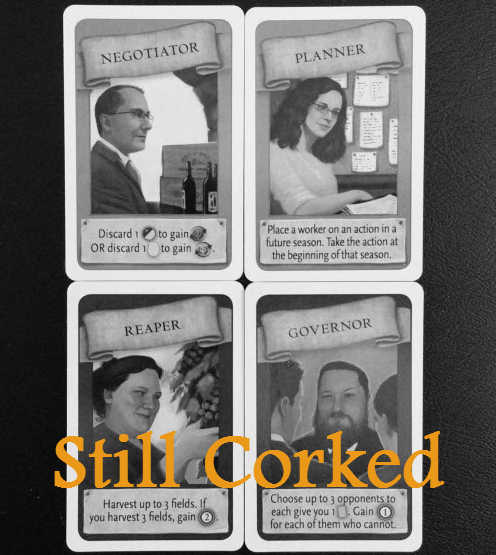
Tier Two Expansion: Extended Board
Revenue is up, production is soaring, and you continue to gain recognition throughout the region. In fact, your success has reached the limits of what the vineyard is capable of doing using a two-season approach. You’ve consulted with your crew and decided it’s time to take your company to the next level by exerting your influence on the region and expanding into year-round winemaking.
Tier Two Expansion: Special Workers
As your wine operations continue to climb the ladders of success, the need to cultivate and protect the quality of your product label becomes paramount. Hiring has become more selective, bringing in a host of new workers with a variety of skilled backgrounds to bolster the vineyard’s grandeur even higher.
Tier Two Expansion: Structures
Your vineyard has never been more beautiful, prosperous, and popular than it is currently, but much of the land’s infrastructure is functioning beyond its original capacity or has begun to deteriorate. The time has come to put a portion of those profits towards for some much needed property improvements.
Tier Three Expansion: Mafia
A new mafia leader has moved to your region of Tuscany, and many local owners such as yourself have decided to curry favor with him in the hopes of a business boost – or at least a little protection.
Tier Three Expansion: Arboriculture
It would appear that your operation knows no bounds. With the vineyard working at peak efficiency, the decision was made to diversify into other products such as apple orchards and tomato fields. However, while this new venture will keep you competitive in the marketplace, if not implemented carefully it could lead to major labor troubles.
Tier Three Expansion: Formaggio
What goes better with wine than a bit of cheese?? With wine sales through the roof, a new opportunity has arisen that will allow you to expand your holdings into dairy operations and be able to offer your customers a complimentary product for purchase.
The Final Takeaway
Tuscany is a product of Stonemaier Games.


